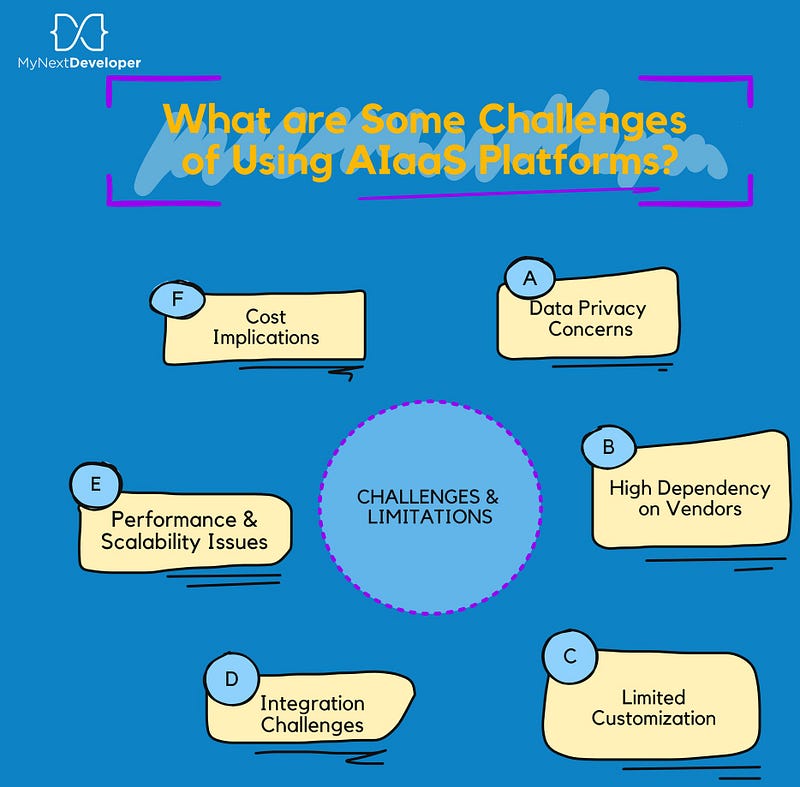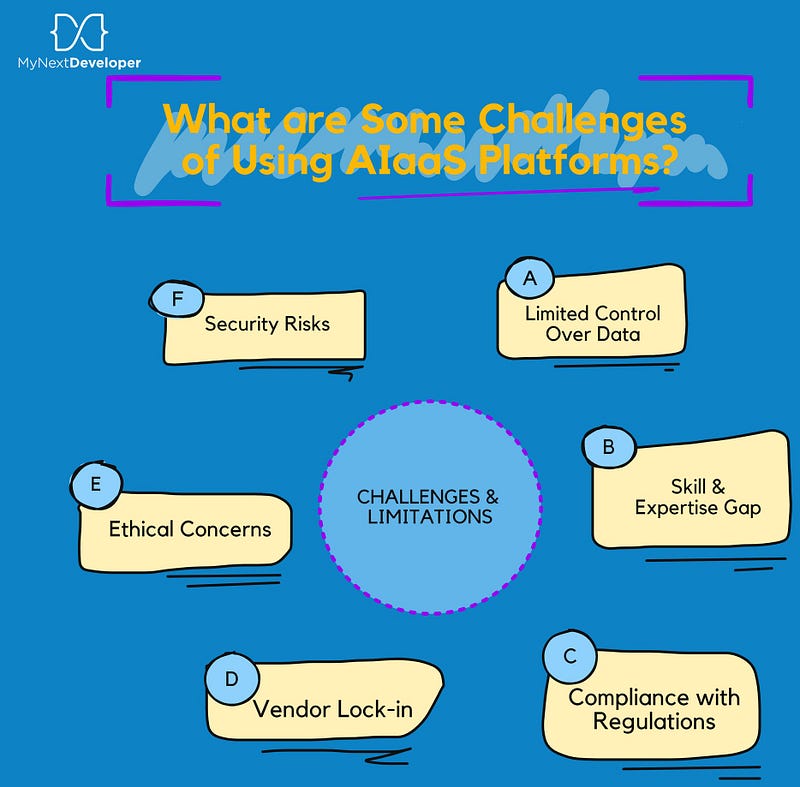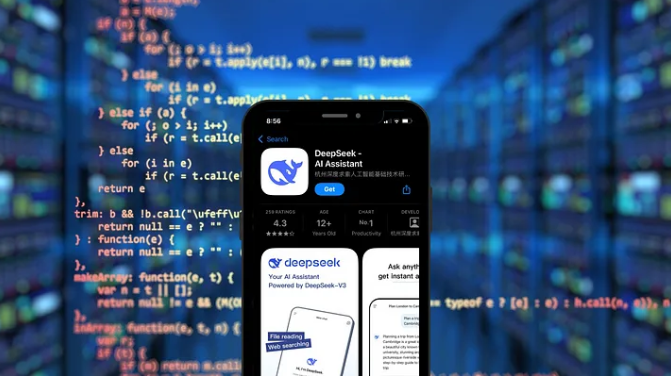The Challenges of Using AIaaS Platforms
The Challenges of Using AIaaS Platforms

It is no surprise that Artificial Intelligence as a Service (AIaaS) is transforming the tech landscape like never before. With new AI developments emerging, businesses can leverage AI capabilities without hefty investments. Yet, this convenience comes with its own set of challenges and limitations. In this blog, we will explore these drawbacks in detail.
High Dependency on Vendors
AIaaS platforms mean relying on third-party vendors on a large scale. This dependence can be risky. If the vendor experiences issues, it might disrupt your AI services. Additionally, changes in vendor policies can have a direct impact on your operations.
Data Privacy Concerns
Data privacy is a significant issue. AIaaS platforms often need access to vast amounts of data. This raises concerns about how data storage, usage and protection. Businesses must follow data protection rules and regulations. As we see, this process can be quite complex and costly at the same time.
According to a report by Enterprise Apps Today, data security is a major concern. It is a serious issue for around 45% of organisations using AIaaS platforms. AIaaS involves handling large volumes of data, which often includes sensitive information. Ensuring data privacy and security is a major challenge in today’s digital scenario.
Limited Customization
AIaaS platforms offer pre-built models and solutions. While convenient, these solutions are often not customizable to the full extent. This limitation can be problematic for businesses with unique requirements. Customizing AI solutions to fit specific needs can be challenging and expensive.
Integration Challenges
Integrating AIaaS with existing systems is not always seamless. Legacy systems may not be compatible with modern AI solutions. This incompatibility can lead to extra costs and time to bridge the gap. Proper planning and expert help are often required.
Performance and Scalability Issues
AIaaS platforms might not always meet performance expectations. Latency issues can arise, affecting real-time applications. Additionally, as your business grows, the AI services need to scale. Ensuring scalability without compromising performance can be a difficulty.
Cost Implications
While AIaaS reduces initial costs, ongoing expenses can accumulate. Subscription fees, usage charges, and extra costs for premium features can add up. Budgeting for these expenses is crucial to avoid financial strain.
Limited Control Over Data

Using AIaaS means storage of your data on external servers. This situation can lead to concerns about data control. If the service provider faces some data breaches, your data is at risk of exposure.
Skill and Expertise Gap
Implementing AI solutions requires specialized skills. There is often a gap between available expertise and the skills required to use AIaaS. Businesses may need to invest more in training programs or hire experts from outside. This process proves to be costly and time-consuming.
Vendor Lock-in
Vendor lock-in is a significant risk with AIaaS platforms. Switching providers can be difficult and expensive. It is due to data transfer complexities and compatibility issues. Businesses need to be careful while analysing vendors to avoid unsatisfactory service.
Security Risks
AIaaS platforms can be targets for cyberattacks. Enforcing strong security measures is crucial for sensitive data protection. Businesses must assess the security protocols of AIaaS providers to mitigate risks.
Ethical Concerns
AI models can learn biases present in training data. This bias can sometimes lead to unfair or biased results. Ensuring ethical AI use requires continuous monitoring. It also needs some changes in AI models, which can be challenging. Also, biases in AI algorithms can lead to their potential impact on decision-making. This tends to worry as much as 35% of organizations, according to a report by BotPenguin.
Compliance with Regulations
Different regions have varying regulations about data usage and AI implementation. Complying with these regulations while using AIaaS can cause complications. Non-compliance can lead to legal issues and hefty fines.
Conclusion
AIaaS platforms offer many benefits, but they are not without challenges. High dependency on vendors, data privacy concerns, and limited customization are significant drawbacks. Integration challenges, performance issues, and cost implications also pose hurdles. Limited control over data, skill gaps, and vendor lock-in further complicate matters. Security risks, ethical concerns, and regulatory compliance add to the complexity.
Businesses must weigh these challenges against the benefits. Proper planning, vendor evaluation, and investment in expertise can help resolve issues. Understanding the limitations is crucial for leveraging AIaaS.
Ready to build your tech dream team?
Check out MyNextDeveloper, a platform where you can find the top 3% of software engineers who are deeply passionate about innovation and powered by advanced AI capabilities. Our AI-enhanced, on-demand, dedicated, and thorough software talent solutions are available to offer you a complete solution for all your software requirements.
Visit our website to explore how our AI-driven approach can help you build your perfect team. Reach out to us for any inquiries or assistance in the field.




